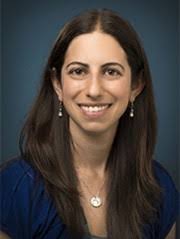We are Women’s offers the WCH community a chance to get to know each other and share our stories. For Jewish Heritage Month, we are featuring some of our Jewish-identifying staff to discuss what Judaism means to them and how their Jewish identity informs their work.

Name: Batya Grundland
Pronouns: she/her
Title & Department: Family Physician, Clinician Teacher, Department of Family Medicine
On the WCH team for:
1. What does being Jewish mean to you on a personal level?
This is hard to articulate because my Jewish identity informs almost everything I do and how I think. From what I choose to eat or not eat, how I structure my week, the values that guide choices for me and my family, the way I think about challenges and opportunities, my love of learning and the ways in which I try to put myself out there in the world. Being Jewish is intrinsic to who I am. I feel proud to be Jewish and deeply value so many of the customs, traditions and teachings while also struggling with others. It is an identity that connects me to the past, informs my present and I hope will guide my future and my children’s future.
2. How does your Jewish heritage inform your work in the healthcare industry, and what is the experience of being Jewish in the healthcare industry like?
I think being Jewish informs my work in healthcare with respect to the values that I try to use to guide my work: treating one’s neighbour as they would themselves, striving for justice, a love of learning and, as part of that, a respect for different points of view even if I don’t always agree. This both informs my individual relationships with patients as well as my leadership roles. I think it has given me greater empathy for individuals and communities struggling with discrimination as they try to figure out ways to integrate into the local community without losing their own identity as, sadly, that has been a consistent theme in Jewish history. I think it is also fair to say, that in my day to day work, I feel the responsibility of representation – that I try to act such that if I were the only Jewish person someone met and if they were to generalize to the entire community about how Jews are from our interaction, that I would be representing the community well.
My experience being Jewish in the healthcare industry varies based on context and time of year. Most days it doesn’t factor prominently. I find I notice my Jewish identity most with things like scheduling as I try to figure out how I feel about working on Friday nights or Saturdays as someone who is not strictly Sabbath observant and wants to fairly contribute to the group but still deeply values many of the customs and the special time with my family that the Sabbath offers. Similarly, around times of Jewish holidays (and there are a lot of them), I take a lot of days off from work at unusual times. I am lucky that no one has ever challenged me or questioned it but it is a bit funny when I get back to work and people say “how was your vacation” and I’m thinking that it wasn’t much of a vacation after spending days cooking and hosting family or spending hours in synagogue. Moreover, the work has piled up as the rest of the world was functioning normally so there is simply the same work to do in less time. I don’t think this is unique to healthcare. I think the other place my experience of being Jewish in the healthcare industry comes up is in the current landscape of EDI work as I’m often not sure where my identity fits. As a non-visible minority (in my personal case—this is not always the case) who comes from a legacy of significant discrimination but as part of a community that can often blend into the larger community and overall does not have worse health outcomes than the general community—it can feel a bit tricky. Finally, there is the experience of microaggressions, usually from patients. Thankfully, especially in recent years, I have found these to be few and far between and often coming from a well meaning place so has not had a deep impact on my day to day experience.
3. What are your favourite things about Jewish culture?
Obviously the food—both the types of food (and this spans a variety of traditions from Ashkenazic traditional foods to more Morroccan flavours and middle eastern cuisine) and the commitment to having high quantities of food available at all times. I also love the many holidays and the traditions that go along with them. I love the way Judaism deliberately acknowledges and honours various life cycle events—both celebratory and the more difficult parts of life. Being involved in Jewish life intrinsically involves being connected to community and this is something I value deeply. Judaism is also a religion that values learning, questioning and productive discourse in the face of disagreement and I love that too. Sorry—that’s a lot of favourites.
4. Tell us one to three things that your colleagues would be surprised to learn about you!
I am the mother of three boys aged 16, 13 and 8.